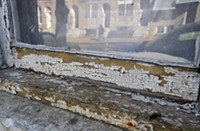Advertisement
Grab your lab coat. Let's get started
Welcome!
Welcome!
Create an account below to get 6 C&EN articles per month, receive newsletters and more - all free.
It seems this is your first time logging in online. Please enter the following information to continue.
As an ACS member you automatically get access to this site. All we need is few more details to create your reading experience.
Not you? Sign in with a different account.
Not you? Sign in with a different account.
ERROR 1
ERROR 1
ERROR 2
ERROR 2
ERROR 2
ERROR 2
ERROR 2
Password and Confirm password must match.
If you have an ACS member number, please enter it here so we can link this account to your membership. (optional)
ERROR 2
ACS values your privacy. By submitting your information, you are gaining access to C&EN and subscribing to our weekly newsletter. We use the information you provide to make your reading experience better, and we will never sell your data to third party members.
Environment
EPA Analyzes Sediments, Air in New Orleans
September 26, 2005
| A version of this story appeared in
Volume 83, Issue 39
Petroleum compounds and fecal bacteria are the main contaminants in the muck coating the parts of New Orleans flooded in the wake of Hurricane Katrina, EPA has announced. People may be at some health risk from the tainted sediments deposited by the receding floodwaters, EPA said. The agency noted that there are no standards for determining human health risks from the presence of fecal bacteria, including E. coli, in sediment or soil. Such standards exist only for water. The agency's testing also showed elevated levels of semivolatile compounds, such as diesel and fuel oils, in the sediment. EPA said skin contact with these materials may cause irritation. EPA also analyzed 18 sediment samples for volatile organic compounds, metals, and pesticides. Aside from three samples with slightly elevated levels of arsenic and lead, the testing found concentrations of these pollutants below levels expected to cause health effects, according to the agency. As the city dries out, EPA will monitor potential risks from inhaling airborne particles of the sediment. In addition, the agency analyzed air in New Orleans for volatile organic pollutants including the gasoline components benzene, toluene, and xylene. EPA said air concentrations of these chemicals in most areas are below the Agency for Toxic Substances & Disease Registry's health standards of concern.



Join the conversation
Contact the reporter
Submit a Letter to the Editor for publication
Engage with us on Twitter